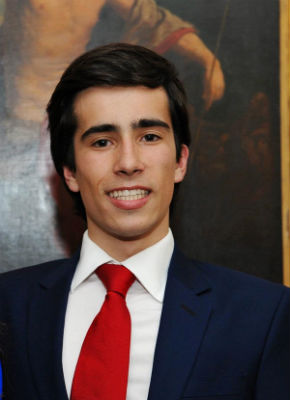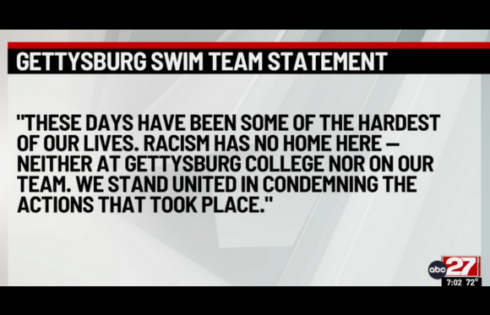
ATIXA has profited handsomely from 2011 ‘Dear Colleague’ letter
A public university will put employees through a sexual-assault training program devised by an organization that opposes due process for accused students in campus rape investigations.
What’s surprising is that San Diego State University is doing this to settle a lawsuit by a student who was falsely accused of rape and allegedly denied due process.
Portugal-born Francisco Sousa was expelled by SDSU after a fellow student, Alexa Romano, accused him of rape in December 2014. (Romano told NBC San Diego three months earlier she was “scared of walking alone” after two reports of sexual assault the same week.)
When administrators investigated, they refused to let Sousa provide evidence that would have likely exonerated him, including text messages, social media posts and witnesses. It also named him as a suspect in a campuswide email.
More than two years later, the lawsuit has been settled and the university will pay damages and clear his disciplinary record, Sousa told The College Fix in a phone interview.
Sousa said he was thrilled with outcome, considering “there was no evidence to substantiate the claims to begin with.”
He filed suit “because I wanted to exonerate my name,” Sousa said. “I’m really pleased about the settlement — they cleared the charges from my record.” SDSU paid $10,000, a relatively small sum to resolve such litigation.
But the entire ordeal has him worried for his future. He expressed concern over what his future employers might think, or his future kids.
“When I eventually have kids… my kids are going to Google my name,” Sousa said. “How will I explain this to them?” But he’s thankful that “now there’s good news from the story — it shows I was vindicated.”
‘I feel determined to stay here’
Now, he is working to rebuild his life and finish his senior year of college.
After Sousa was forced to leave San Diego State, he started taking classes at a different college in southern California. He didn’t try to return to SDSU.
 He keeps a very low profile at the school, which he declined to name to protect his reputation from his new peers.
He keeps a very low profile at the school, which he declined to name to protect his reputation from his new peers.
Sousa will graduate at the end of this semester with a major in business and a minor in economics, and he’s now focusing on studying for finals and applying for jobs in the financial sector.
He hopes to find a job that will let him put what he’s learned in the classroom into practice. “Anything in the business area, from sales to financial advising, I’ll be happy with.”
Sousa, who came to the United States for college after being raised in Portugal, said that he hopes to stay in America for at least a few years.
“I very much enjoy being in United States, it’s a great country, and even after all that happened to me, I feel determined to stay here.”
San Diego State did not respond to Fix queries for comment. Romano, who accused Sousa, has not responded to a Facebook message from The Fix Sunday, her only known contact.
‘Real victims’ have been mistreated too
Sousa also expressed praise for the additional training campus employees will undergo.
According to the settlement, three school employees who conduct sexual-assault investigations will be sent to a Title IX “Civil Rights Investigator Training and Certification Course” offered by the Association of Title IX Administrators (ATIXA), or a similar program.
Sousa says he hopes that this additional training will help improve the sexual assault investigations for all parties. “Not just for falsely accused students, but for victims of sexual assault too — everyone deserves to be treated fairly.”
While he understands that sometimes trials are unfair to accused students, Sousa said that sometimes true victims are mistreated as well.
“More training is excellent. I don’t want this to happen to anyone else again. Real victims, and I know some, are also mistreated too.”
Domenic Lombardo, Sousa’s attorney from his first lawsuit against SDSU, told the San Diego Union Tribune that training for the employees is needed so that they will identify accused students “in a measured, thoughtful and methodical way” in the future.
Sousa’s second lawyer, Mike Marrian, also sought the training.
Due process group stands up for rapists
ATIXA has made a lucrative business out of helping colleges respond to sexual-assault allegations following the Obama administration’s 2011 “Dear Colleague” letter, which prescribed specific investigation protocols and ordered colleges to use a low evidence standard.
One of its most popular products is a four-day training that runs $2,699 per person. It also ratified a “position statement” in 2015 that called for colleges to offer “victim advocates” to students making accusations, but told colleges they didn’t have to provide advocates to accused students.
The group has also advised colleges how to ward off appeals from accused students.
Brooklyn College Prof. KC Johnson quoted from an ATIXA email in 2012 that recommended college presidents or “any high-ranking university official” be excluded from the appeals process.
Their involvement in deciding appeals makes them “a target personally for a lawsuit,” according to the “Tip of the Week” in the email. “Why serve that prize to the plaintiff’s attorney on a silver platter?”
ATIXA’s founder, Brett Sokolow, has accused the Foundation for Individual Rights in Education, which defends campus due process, of “standing up for the rights of rapists everywhere,” according to FIRE’s Will Creeley.
He wrote about Sokolow’s comments and practices less than two months after the Dear Colleague letter was released: “In conflating those accused of an act with those guilty of an act, Sokolow’s disdain for due process echoes the worst instincts of the angry mob.”
Like The College Fix on Facebook / Follow us on Twitter
IMAGE: Paolo Schorli/Shutterstock, Francisco Sousa






Please join the conversation about our stories on Facebook, Twitter, Instagram, Reddit, MeWe, Rumble, Gab, Minds and Gettr.